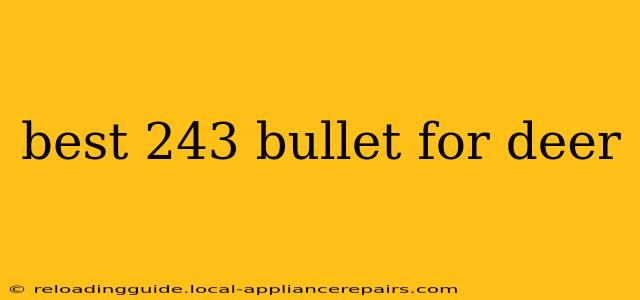Choosing the right ammunition is crucial for a successful deer hunt. The .243 Winchester, known for its accuracy and manageable recoil, is a popular choice for many hunters, especially those new to bigger game. However, selecting the best .243 bullet for deer depends heavily on several factors, including shot distance, deer size, and hunting style. This guide will delve into the key considerations and help you make an informed decision.
Understanding .243 Bullet Types and Their Performance
Before diving into specific recommendations, let's understand the different types of .243 bullets and their characteristics:
1. Full Metal Jacket (FMJ):
- Characteristics: A solid copper or lead core encased in a metal jacket. These are generally not recommended for hunting deer due to their tendency to pass through the animal without sufficient expansion, leading to a less humane kill and potential loss of meat. They are better suited for target practice.
2. Soft Point (SP):
- Characteristics: These bullets have a soft lead core exposed at the tip, facilitating expansion upon impact. They offer good accuracy and reliable expansion at moderate ranges, making them a solid option for deer hunting.
3. Hollow Point (HP):
- Characteristics: Featuring a cavity at the bullet's tip, hollow points are designed for maximum expansion upon impact. This increases stopping power and reduces the chance of pass-through. Different designs within the hollow point category (e.g., boat tail, polymer tip) influence expansion characteristics.
4. Controlled Expansion (CE):
- Characteristics: These bullets are engineered for controlled expansion, aiming for a balance between penetration and energy transfer. They are designed to maintain integrity while expanding reliably, even at higher velocities or on tougher bone structures. A popular choice for hunters seeking consistent performance across a range of shots.
Factors to Consider When Choosing Your .243 Deer Bullet
Several factors play a vital role in choosing the most suitable .243 bullet for deer hunting:
1. Shot Distance:
- Shorter Ranges (under 200 yards): A wider variety of bullets will perform adequately. Soft points and hollow points are viable options.
- Longer Ranges (200 yards and beyond): Bullets with superior ballistic coefficients (BC) are crucial for maintaining accuracy and energy at extended distances. Look for heavier bullets with controlled expansion designs or boat-tail designs for better flight stability.
2. Deer Size:
- Smaller Deer (e.g., whitetail does): Lighter bullets (around 80-100 grains) can be effective, offering good expansion without excessive penetration.
- Larger Deer (e.g., mature bucks): Heavier bullets (100 grains and above) provide greater penetration and energy transfer, especially if you anticipate longer shots or shots through heavier bone structures.
3. Hunting Style:
- Stalking/Spot and Stalk: Accuracy is paramount, so prioritize bullets known for their accuracy at longer ranges.
- Stand Hunting: Shorter shots are common; a wide range of bullets may work well.
Top .243 Bullet Recommendations for Deer
While specific recommendations depend on individual hunting situations, some consistently high-performing bullets include:
- Hornady Superformance GMX: Known for its consistent expansion and deep penetration.
- Federal Premium Fusion: A reliable all-around bullet with good accuracy and controlled expansion.
- Nosler Ballistic Tip: Offers excellent accuracy and expansion, making it suitable for both short and medium ranges.
Disclaimer: Always consult your state's hunting regulations regarding legal ammunition types and ethical hunting practices. Proper bullet selection is only one aspect of safe and responsible hunting. Accurate shot placement remains the most critical factor for a quick, clean kill.
Conclusion: Making the Right Choice
Selecting the best .243 bullet for deer is a matter of careful consideration. By understanding the different bullet types, their characteristics, and the factors outlined above, you can significantly improve your chances of a successful and ethical hunt. Remember to practice extensively with your chosen ammunition to ensure you’re comfortable with its performance and accuracy before heading out into the field.

